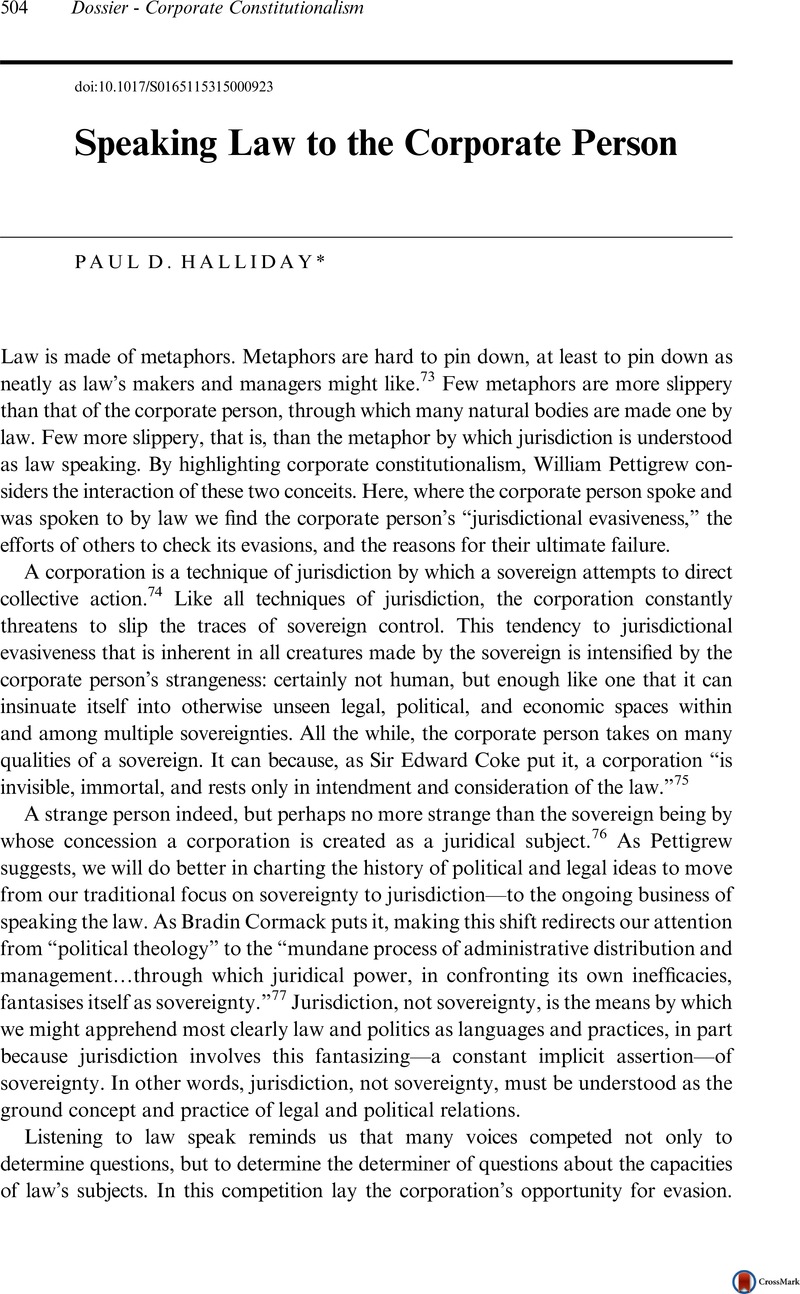No CrossRef data available.
Article contents
Speaking Law to the Corporate Person
Published online by Cambridge University Press: 18 January 2016
Abstract

- Type
- Articles
- Information
- Copyright
- © 2016 Research Institute for History, Leiden University
Footnotes
Paul Halliday is Julian Bishko Professor of History & Professor of Law and a specialist in legal history as well as the history of Britain and the Empire from 1500-1850.
References
73 Winter, A Clearing in the Forest: Law, Life, and Mind.
74 Jurisdiction is “a technology or set of techniques that capture or attach its objects to law.” Dorsett and McVeigh, “Questions of Jurisdiction,” 12.
75 Renton, The English Reports, vol. 77, 973 (The Case of Sutton’s Hospital, 1615, in 10 Co. Rep. 32b).
76 For all the significance of Otto von Gierke’s account of the corporation as arising by an inescapable logic of collective action, without the necessity of legal recognition, I take it for granted that a corporation exists as a juridical being only by concession of, or delegation by, the state. For discussion, see Ciepley, “Beyond Public and Private: Toward a Political Theory of the Corporation.”
77 Cormack, A Power to do Justice: Jurisdiction, English Literature, and the Rise of the Common Law, 1509–1625, 8–9.
78 TNA, KB21/5, f. 48v and KB21/5a, fols. 16v. and 20v. Neuhauser, “Privy Council Regulation of Trade Under James I,” 1034–5. This result was achieved using process by information in the nature of quo warranto. Notably, this was the same year in which Coke’s court decided the Case of Sutton’s Hospital (cited above, note 76), in which Coke’s dicta laid down the basic elements of corporate personhood that have been quoted ever since, and Bagge’s Case, by which the same court showed corporations that it could force them to do the court’s bidding by writs of mandamus. Renton, The English Reports, vol. 77, 1271 (11 Co. Rep. 93b).
79 Robert Cover, “Nomos and Narrative,” Harvard Law Review 97 (1983–84), 31.
80 Benton and Ross, Legal Pluralism and Empires, 1500–1850.
81 Cover, “Nomos and Narrative,” 53.
82 Cormack, Power to do Justice, 9.
83 We might thus usefully apply to corporations the language Lauren Benton uses to discuss ships, which trace paths of jurisdiction across oceans otherwise empty of sovereign claims. Benton, A Search for Sovereignty: Law and Geography in European Empires, 1400–1900, ch. 3.
84 Stern, The Company State: Corporate Sovereignty and the Early Modern Foundations of the British Empire in India.
85 Thus Cover specified the speech that is jurisdiction as “the judge’s elaboration of the privilege of force.” Cover, “Nomos and Narrative,” 54.
86 13 George III, c. 63.
87 Travers, Ideology and Empire in Eighteenth-Century India: The British in Bengal, ch. 5.


